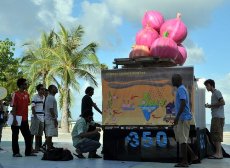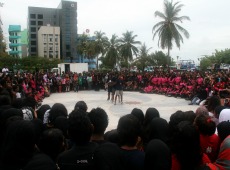The Human Rights Commission of the Maldives (HRCM) has urged political parties to support the Elections Commission to hold the presidential election tomorrow, and called on “as many Maldivian citizens as possible to go out and vote”.
The United States has called on political leaders to ensure participatory democracy is not undermined, and expressed concern about the potential postponement of Saturday’s election.
The Progressive Party of Maldives (PPM) and Jumhooree Party (JP) presidential candidates have demanded fingerprint verification of the finalised voter registry, with police refusing to support the election without the candidates’ signatures. After submitting letters to the Elections Commission (EC) soon after midnight, the party’s leaders have been unreachable.
Signing of the registry by the candidates is a new demand contained in the Supreme Court’s guidelines for the election, following its annulment of the first round of polls shortly before midnight on October 7.
“The Human Rights Commission of the Maldives (HRCM) urges political parties to prioritise national interest and support the elections commission in this difficult moment to hold the presidential election as scheduled,” the commission declared in a press statement issued today.
“We call on as many citizens as possible to go out to vote and not to obstruct the vote,” it added.
Earlier this week the HRCM member and acting chairperson Ahmed Tholal told local media that the commission had complete confidence in the Elections Commission’s ability to conduct the upcoming presidential election freely, fairly and in a transparent manner.
Multiple Maldivian and international civil society organisations have also called for the presidential election to be held as scheduled tomorrow.
United States and India
The United States Embassy in Colombo has also expressed concern that the October 19 election may be postponed, and called on political leaders to ensure participatory democracy is not undermined in a press statement today.
“Political leaders must come together to ensure that participatory democracy is not undermined and that free, fair, credible and inclusive elections can take place peacefully and in line with international standards. Further efforts to delay the electoral process could undermine the will of the people to choose their representative,” the US Embassy stated.
“The Electoral Commission has made concerted efforts to comply with the Supreme Court’s requirements for a new first round, including the re-registration of thousands of voters,” it noted. “The United States is concerned that the re-organised first round of the Maldivian presidential election, set for October 19, may now be postponed.”
The US also highlighted the Maldives’ constitutional requirement that a new president be sworn in by November 11, 2013.
India echoed the United States’ “deep concerns” that the presidential election may be further delayed and “once again urged the government of Maldives and presidential candidates” to hold the election tomorrow and uphold the Maldives’ constitution, in a press release issued by the High Commission of India in Male’ tonight.
“We call upon all political parties to show a spirit of understanding, cooperation and accommodation by supporting the efforts for holding elections as scheduled, including by accepting the voters’ register,” stated the Indian High Commission. “Holding of free, fair and credible elections without further delay is essential for fulfilling the political aspirations of the people of Maldives.”
President Mohamed Waheed has meanwhile urged parties “not to act in a fashion that obstructs holding of the election and to prioritise national interest over personal interest”.
Transparency Maldives
Local NGO Transparency Maldives has reiterated its appeal for the presidential election to take place as scheduled.
“We have previously called for the presidential election to be held in the timeframe stipulated within the constitution,” Transparency Maldives’ Advocacy and Communications Manager Aiman Rasheed told Minivan News today.
“In resolving the rising tensions and disagreements in the country, Transparency Maldives appeals to all actors, especially the Supreme Court, to uphold the spirit of the Constitution and electoral deadlines and respect people’s electoral choice,” reads a September 28 Transparency Maldives press statement.
The NGO also previously appealed to “all actors and institutions to refrain from undermining the integrity of and confidence in the election day processes without credible evidence of fraud.”
Rasheed noted that “We have already missed two deadlines: holding a runoff election within 21 days after the first round and holding an election 30 days prior to the expiry of the existing presidential term November 11,” as stated in articles 111 and 110 of the constitution.
“The only deadline that has not been missed is holding the presidential election before October 20,” he continued.
“The Supreme Court’s verdict mandates all state institutions, including political parties, must work with the Elections Commission to ensure a free and fair election,” he explained.
“An election cannot be held without everyone joining together – civil society, political parties, media, state institutions – to support the Elections Commission,” he added.
Meanwhile, the anti-corruption NGO has stated that it is “fully ready for extensive observation of the October 19 presidential election”.
Transparency fielded a team of 400 election monitors during the first round of September 7, stating that the process was fair and credible and that incidents observed on the day would not have had a material impact on the outcome of the election.
In late August, Transparency Maldives expressed doubts over the integrity of the Supreme Court, urging it to “maintain its actions in such a fashion that the court does not allow further diminishing of its integrity and to be transparent in its functioning and sharing of information to strengthen the public trust towards the institution.”
The NGO also recently noted that the failure of parliament and the Judicial Service Commission (JSC) to address alleged integrity issues of the Supreme Court judges have “created avenues for political and other actors to question the conduct, injunctions and verdicts of the Supreme Court”.
The Home Ministry this month announced that it would be investigating Transparency Maldives for challenging the Supreme Court, prompting the NGO’s international affiliate – Transparency International – to express its concern “grave concern” about staff and volunteer safety and “alarm” over the intimidation and public allegations threatening its Transparency Maldives chapter.
Maldives NGO Federation
In light of the HRCM statement, the Maldives NGO Federation, representing over 60 local civil society organisations, also reiterated its support for the Elections Commission.
“The NGO Federation of course appreciates the hard work of the Elections Commission and we fully trust in the work they are doing,” NGO Federation President Ahmed Nizam told Minivan News today.
“Given the Supreme Court’s verdict, it’s will not be very easy for the EC to go ahead and hold the election without political parties signing the voter registry. We are hopeful that the talks held tonight will help solve the issue,” he noted.
“I would like to believe that the political leaders of this country will be responsible people,” he continued. “And we stay hopeful that we will get the opportunity to exercise our constitutional right [to vote] tomorrow.”
“The EC Chairperson has said that even if the political parties sign the registry by 7:30am tomorrow morning the election can still be held,” he added.
Following the Supreme Court’s ruling to indefinitely delay the presidential election’s September 28 second round until a verdict in the JP case against the EC had been reached, the NGO expressed concern over the election delay and urged the Supreme Court to deliver a speedy verdict and to allow elections to proceed as per the constitution.
The Home Ministry subsequently demanded the NGO provide a copy of its press release regarding the Supreme Court.
The NGO Federation also recently expressed its concern that political parties have been attempting to discredit the Elections Commission by inciting hatred toward the institution in an effort to obstruct the holding of a free and fair presidential election.
The NGO Federation declared their confidence in the EC and noted the essential role the commission has played in holding free and fair elections over the past five years.
International Federation of Human Rights
International Federation of Human Rights (FIDH) NGO said it is continuing to observe developments in the Maldives, and is calling for the outgoing government to ensure Maldivian people were given their right to vote in a free and fair election held in accordance with international standards.
Expressing concern about “mixed signals” being given to Maldivian people and the international community about holding an election, the international NGO said there was growing anxiety around the world for voting to be held without further delays.
FIDH said it continued to hold particular concern over the decision by the country’s Supreme Court to annul the first round of the presidential election held on September 7 – an order it claimed, in a joint statement with the Maldivian Democracy Network (MDN), was “unjustifiable”.
“The unjustifiable delay and judicially forceful suspension of the second round of the election, due on 28 September, indicates an encroachment of the judiciary over the powers of the Elections Commission, an independent constitutional body answerable to the Parliament of the Maldives,” read the statement from MDN and FIDH on October 8.
The statement described the court’s verdict as being founded on “materially baseless arguments”, after the first round was “applauded as a success by the international community.”
“Maldivian authorities must swiftly bring the electoral process to an end, in a free and fair manner,” said FIDH President Karim Lahidji at the time.
Likes (1)Dislikes
(1)Dislikes (0)
(0)  “We’ve seen incredibly creative actions in the Maldives by grassroots activists fighting climate change too and with such international concern for the political situation there, similar tactics could be employed at the current time with great effect,” he added.
“We’ve seen incredibly creative actions in the Maldives by grassroots activists fighting climate change too and with such international concern for the political situation there, similar tactics could be employed at the current time with great effect,” he added.